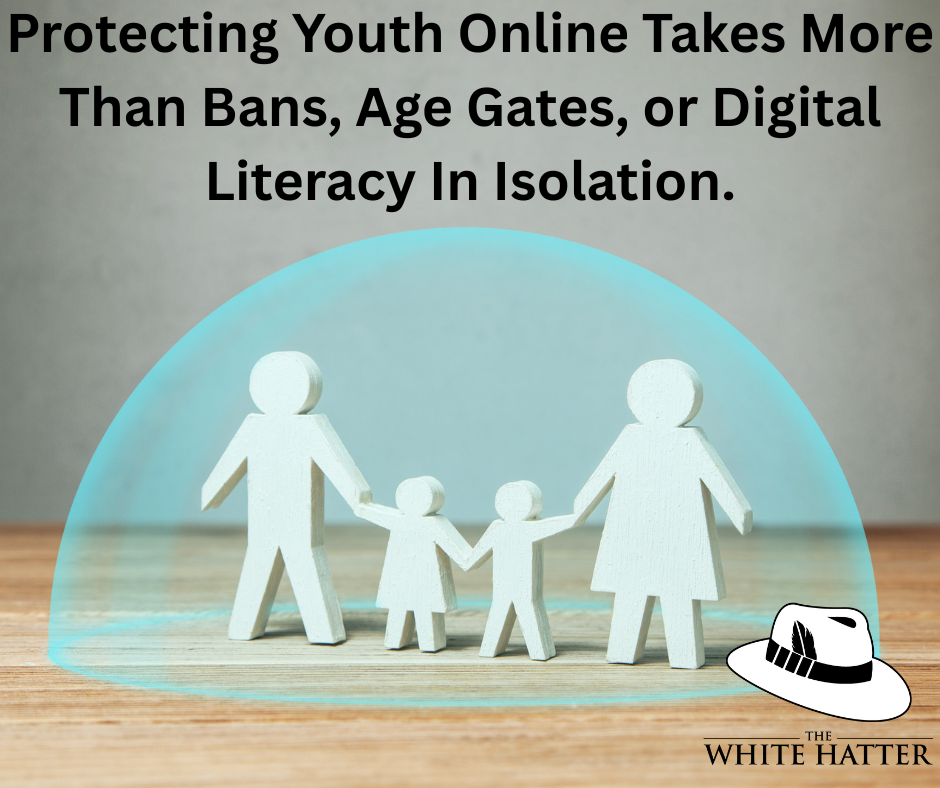AI, Entry-Level Jobs, and the Future Our Kids Are Walking Into: What Parents, Youth, and Teens Need to Think About
- The White Hatter

- Nov 27, 2025
- 5 min read

On a recent episode of 60 Minutes, Anderson Cooper interviewed Anthropic CEO Dario Amodei. (1) During that conversation, Amodei said something that has been echoed across the tech world, artificial intelligence could eliminate half of entry level white collar jobs, and push unemployment up by ten to twenty percent within the next one to five years. If this prediction becomes reality, this will be a seismic cause and effect when it comes to future job opportunities.
For many parents, caregivers, youth, and teens, this kind of statement raises a very real question, “What kind of job market will our kids step into, and how do we prepare them for it?”
This isn’t the first time new technology has changed employment opportunities. However, the difference today is speed. Previous technological shifts gave society years, sometimes decades, to adjust. However, AI is not moving at that pace, development is happening so quickly that families, schools, and industries are struggling to adapt in real time. This matters to our children for reasons that go far deeper than job titles.
There is a common belief that entry level jobs are simply repetitive tasks that can be automated without much consequence. In reality, these early career positions serve a much more important purpose. They act as the apprenticeship layer for almost every profession.
We are already seeing this tension play out. Without apprenticeships and hands-on learning, organizations lose their long term capacity to grow or even function.
This is the part of the conversation that rarely shows up on social media discussions. People talk about disappearing jobs, but not enough people talk about what happens when the training ecosystem itself collapses.
This is why parents and educators need to understand the bigger picture. AI is not only transforming the job market, it is reshaping the entire system that teaches people how to work.
There is no doubt that some jobs truly involve repetitive rote cognitive tasks that AI can handle well. Just as factories replaced certain forms of physical labor, AI will take over certain types of mental work.
We don’t think it’s accurate to say that AI will replace all jobs, however, what it will do is reveal which roles rely mainly on predictable, repeatable, rote tasks.
What matters now is how young people respond. Those who cling to old systems and refuse to learn new tools we believe will struggle to find employment opportunities. Those who engage with AI, understand it, and learn how to use it in their work will more likely thrive.
We have lived through this kind of transition before. About a hundred years ago, the word “computer” referred to a person whose job was to perform calculations for companies and government agencies. That role vanished once machines took over the math, but it didn’t end opportunity. It sparked an entirely new industry and created career paths no one had imagined.
If you’ve watched the film Hidden Figures, you’ll remember the story of the African American women at NASA who worked as human computers. When they saw that machines were going to replace their jobs, they retrained themselves to operate the very technology that was about to disrupt their work. Their experience is a powerful example of how adaptation opens doors instead of closing them.
AI will follow a similar pattern. New roles are coming. New skill sets will be needed. The future will involve directly working with and managing AI systems, rather than competing with them.
This is why digital literacy, critical thinking, and the ability to adapt will become some of the most important life skills our children can learn.
AI has made impressive progress, but it still struggles in areas that rely on empathy, physical dexterity, and real-world judgment. These limitations matter when parents and teens think about future-proof careers. Some fields will be harder to automate because they rely on human contact, nuanced decision making, or skills that don’t translate well to algorithms or robotics.
Healthcare roles that involve direct interaction with people fall into this category. Nursing, counselling, rehabilitation therapy, and frontline medical care require emotional presence, trust building, and hands-on support that AI can’t replicate. These professions depend on empathy and complex judgment, which keeps them in high demand even as technology evolves.
Skilled trades are also well positioned for the future. Electricians, plumbers, builders, and technicians working in renewable energy rely on physical skills and problem solving in unpredictable environments. AI can assist with planning or diagnostics, but the actual work requires adaptability and on-site expertise that machines can’t match.
Cybersecurity and AI oversight roles will continue to grow as well. As AI expands, so does the need for professionals who can build, monitor, and safeguard these systems. These careers blend technical knowledge with strategic thinking and ethical decision making, making them highly resilient in an AI-driven world.
Creative entrepreneurship remains another strong path. Young people who learn how to use AI as a tool instead of a replacement can build unique products, services, and online businesses. AI can support the creative process, but it can’t replace imagination, innovation, or the ability to spot new opportunities.
Sustainability focused careers are also rising quickly. Fields like green technology, climate science, resource management, and even hospitality aimed at sustainable travel rely on human insight, collaboration, and values-based decision making. These jobs combine technical knowledge with a commitment to solving real-world environmental challenges.
First responder careers will remain essential. Police officers, firefighters, paramedics, and military personnel face complex and unpredictable situations that demand human judgment, compassion, and physical presence. These roles require rapid decision making under pressure, something AI is not equipped to handle.
So, what can parents, caregivers, and educator do today to help prepare our kids for the job market of the future?
Teach adaptability as a core value
The jobs your child may hold in 15 years might not exist yet. Encourage curiosity, openness to new tools, and a willingness to learn throughout life.
Help them build skills AI cannot replace
These include creativity, problem solving, communication, ethical reasoning, teamwork, and emotional intelligence. These are hard to automate and remain essential in every industry.
Introduce them to AI in healthy, hands-on ways
Avoid fear. Encourage thoughtful use. Help them understand how to use AI as a tool rather than treating it as a shortcut.
Talk openly about the job market
Help them understand that change has always been part of technological progress, and that they have agency. The future is not something happening to them. It is something they can participate in.
AI is reshaping work at a pace we have never seen before. Entry level jobs, which once served as essential apprenticeships, are disappearing, and this has serious implications for how organizations develop future talent.
Preparation matters more than fear. Young people who learn to work with AI, take on new responsibilities, and build skills that reach beyond what automation can do are the ones who will thrive. The teens who come out ahead will be those who use their curiosity and creativity to guide AI, not those who let the technology shape their thinking into something quicker but ultimately more shallow.
Digital Food For Thought
The White Hatter
Facts Not Fear, Facts Not Emotions, Enlighten Not Frighten, Know Tech Not No Tech
References














